Ridiculous/Hilarious/Terrible/Cool (14 page)
Read Ridiculous/Hilarious/Terrible/Cool Online
Authors: Elisha Cooper

BOOK: Ridiculous/Hilarious/Terrible/Cool
10.52Mb size Format: txt, pdf, ePub
The Girl didn't like him dealing. When they arrived at his house that day, he told her he needed to bag some of the pot in the room he shares with his brother, the room with the huge poster of the scantily-clad aerobicizing black women from the late '80s. The Girl went to his bedroom. After he was done bagging, he walked in and there she was lying on his bed. A girl on a bed. What was he supposed to do?
“If we don't do anything for a while,” he says with a shrug, “we end up doing something.”
Afterward The Girl was crying but would not tell Anthony why. Her silence made him angry so he threw a sneaker at the wall, which is what his father heard from downstairs. His father came up and searched the place but didn't find anything (The Girl was in the closet behind some coats), though this was small relief as, in the most significant development from that afternoon, The Girl got pregnant.
Or so The Girl says. That's the reason she gives for slapping Anthony on the train. And though she tells Anthony he won't have to do anything with her and the baby, that she's relieving him of all responsibility, Anthony feels stuck. He feels he should do the right thing, whatever that is. The crazy part of all this is that Anthony is not even The Girl's boyfriend anymore. She's going out with The Dude.
“I don't know what's going on!” Anthony calls out, eyes bugging even larger than normal. “You want to know. But do you
really
want to know?”
really
want to know?”
He slaps the table.
“Until she get a fat stomach or another dude, it's the wait-and -find-out-method.”
Adding to his problems, as he and The Girl were riding the train back to Payton, someone robbed him. Or, someone robbed Anthony's cousin, taking the cash out of her wallet in Anthony's backpack. Now Anthony has to pay his cousin ten dollars. His reward, he says, for being a good guy.
Anthony stops telling his side of the story. The girls at the table are long gone, leaving him staring into space. There's little left to say.
“That was my yesterday.”
AP biology has a higher percentage of gawky students than the rest of high school. It's scientifically provable. More skinny kids, more squat kids, more pimples, more unintended mustaches, more striped sweaters (more sweaters, period). One lab group is particularly ungainly: a girl with too-tight jeans and limp hair, a boy whose unshowered hair looks as if it doesn't want to be in the room but can't decide which door to exit through, a lanky boy in dress shoes one size too big.
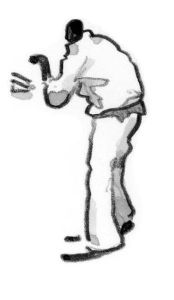
The lab group is running an experiment on DNA sequencing. As they squirt blue marking dye on micropipettes and slide them into trays, they make small talk:
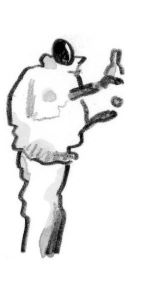

“You using the
electrophysylater
?”
electrophysylater
?”
“After we
electro paracify
.”
electro paracify
.”
Then the trays are placed into a humming centrifuge, where the particles are separated into their various elements, in much the same way that the centrifuge of high school has separated these students into AP biology.
After biology class is over, Daniel Patton walks through the halls, dress shoes squeaking. He's holding to his ear the Palm Treo 650 smartphone he got for Christmas. After checking his messages (none), he puts the Treo back into his new leather shoulder bag. With the new bag and the new phone, Daniel looks less like a young politician, and more like a young Wall Street banker.
Daniel doesn't know it, but the Harvard admissions office has been calling his guidance counselor. They're inquiring about Daniel's scores and his grades, wondering if they have improved. Daniel took his ACT again and his score went up slightly. His grades are the same. The word is that if there is any way for Harvard to admit him, they will.
Phys ed has moved indoors to the gym. They're playing badminton. Not badminton, really, but a game best described as Hit the Ceiling with the Birdie. The gym is alive with parabolas, everyone swinging their rackets and singing along to the R. Kelly song blasting from a boom box. If the point of phys ed is to exercise, though, then Hit the Ceiling with the Birdie serves its purpose.
After ten minutes, even this exertion proves too much. Some girls get the idea of playing badminton prone. The developing philosophy for phys ed seems to be
Why do something standing up when you can do it lying down?
Why do something standing up when you can do it lying down?
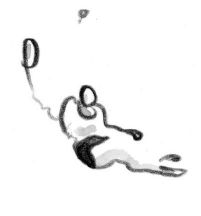
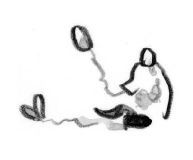
Emily has new green contacts. Why? Why not. Given Emily's coloring, the green is somewhat incongruous. They relax her appearance, though, making it less severe as she strides from class to class. Not that she's gone soft or anything.
Emily's soccer team lost in the championship game of their practice indoor season. The game went into overtime and Emily didn't know that overtime was sudden death and she passed to a teammate who lost the ball and then the other team scored.
Emily blames herself. She blames herself for passing. She says she could have dribbled around the other team and shot and scored, no problem. That's what she says.
Later she wonders, why
didn't
she take that shot? In an unguarded moment, Emily says she hates shooting.
didn't
she take that shot? In an unguarded moment, Emily says she hates shooting.
“I don't want to miss. I'd be embarrassed,” she admits. She hasn't figured out why this is so, but deep down inside her is this hang-up.
Her fear of shooting started with her club team, the Windy City Pride. When Emily began playing with the Pride she saw that her skill lay in passing. Her coach saw this too, and encouraged it. She became the player who led the team to the goal, not the one who scored it.
Goal scorers are free spirits, impulsive and ballsy. Emily is not that. She's routinely the best player on the field, with technical skill far above anyone else's. But she's a perfectionist. If she's not going to do something well, she's not going to do it, and over time that has prevented her from taking chances. It's the flaw in her game.
Emily says she wants to improve her shot. She knows she needs to work on it for her team to do well in the upcoming season. But how do you improve your shot if it's not in your foot, but in your head?
Final exams. The
pock-pock-pock
of the Ping-Pong tables has been replaced by the scratch of pencils and the clicking of laptops. Teachers stand at the front of classrooms, arms folded, legs crossed, staring out, thinking about,
what?
pock-pock-pock
of the Ping-Pong tables has been replaced by the scratch of pencils and the clicking of laptops. Teachers stand at the front of classrooms, arms folded, legs crossed, staring out, thinking about,
what?
The silence magnifies the sounds that do occur: the footsteps of a student walking to the water fountain, the rumble of the "L,” the smack of a blue booklet dropped on its way to the front of class.
Once students finish, there's a lot of free time. Especially for seniors. In the library, Maya is sitting at a table with Ben&Andy. Ben&Andy are making noise and chewing gum and entertaining Maya with stories until the librarian waddles over and tells them to
shhh
.
shhh
.
They keep telling stories. The first is about how Ben almost got busted by a cop for climbing a chain-link fence into a deserted lot. The second is about a party that Andy went to where a house got destroyed, books ripped in half and laundry detergent poured everywhere. Ben begins a third story as he opens a bag of carrots. The story's most engaging aspect, given that Ben talks with his mouth open, is whether or not a carrot will jump out of his mouth and onto the table.
None do. Maya looks at Ben, her right eyebrow raised, her tongue turning her cheek into a tent. The talk turns to every-one's plans for their last semester here at Payton.
“Do as much as we can,” says Andy. “But, no schoolwork.”
“Yeah, make a mockery of our school,” says Ben. “My dream is to suspend two bungee cords in the atrium and have people up there tumbling.”
“I'd let loose chickens,” says Andy. “Numbered chickens. All over the school. But the chickens would be numbered one, three, four, so that, yeah, when they got rounded up, everyone would be going around trying to find number two. Get it?”
Everyone does.
“See, if I were to let chickens loose,” says Ben, “I'd just let them loose.”
Shhh
. The librarian waddles over again. The talk turns to a whisper, and to dating. Classmates who make out in the hallway, seniors who hook up with underclassmen, girls who have “associated” with every one of their friends. Then, after some hemming and hawing, it's revealed that one-half of Ben&Andy is going out with Maya.
. The librarian waddles over again. The talk turns to a whisper, and to dating. Classmates who make out in the hallway, seniors who hook up with underclassmen, girls who have “associated” with every one of their friends. Then, after some hemming and hawing, it's revealed that one-half of Ben&Andy is going out with Maya.
The bell rings. Time for class.
Two girls lean against the lockers and argue. They came here to the far end of a hallway so they could not be overheard. However, the acoustics of the hallway are such that everything that the brunette girl says is amplified, and everything that the blond girl says comes out as an indecipherable
“Rar rar rar.”
The argument sounds one-sided, and goes like this:
“Rar rar rar.”
The argument sounds one-sided, and goes like this:
“You yell at
me,
Carey!”
me,
Carey!”
“Rar rar.”
“You disrespect me.”
“Rar.”
“What am I supposed to do?”
“Rar rar rar rar.”
“You text message me and it was like
so
rude.”
so
rude.”
“Rar.”
“Whatever. Ha ha ha.”
“Rar rar rar rar rar rar rar rar rar rar rar rar rar rar rar rar rar rar rar rar rar.”
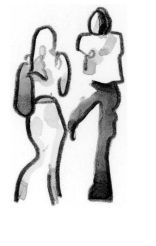
Other books
Dark Dreams by Michael Genelin
Under His Claw by Viola Grace
Death Knows My Name (Memory Keepers) by Narome, Casse
The Alphas Emergence of the Alphas by A.J. Winter
Making the Grade by Marie Harte
The Colonel's Lady by Clifton Adams
The Curse Of The Diogenes Club by Anna Lord
The Whipping Boy by Speer Morgan
The Shoestring Club by Webb, Sarah
Crematorium for Phoenixes by Nikola Yanchovichin